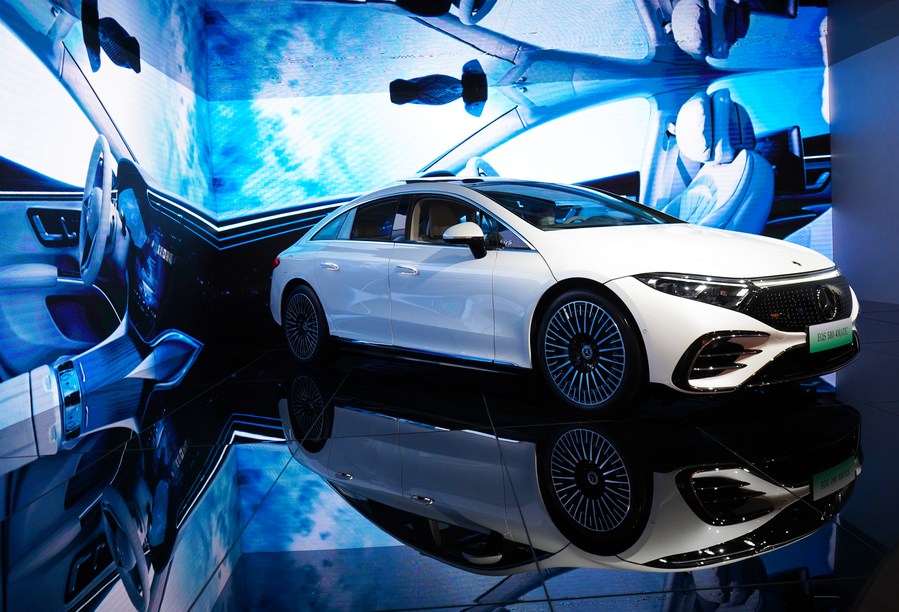Chinese, foreign auto companies expand cooperation in NEVs through CIIE

Photo taken on Nov. 6, 2022 shows a new energy vehicle of German automaker Mercedes-Benz at the automobile exhibition area of the fifth China International Import Expo (CIIE) at the National Exhibition and Convention Center in east China's Shanghai. (Xinhua/Jin Haoyuan)
The automobile exhibition area at the fifth China International Import Expo (CIIE) has become an arena for green travel technologies of international new energy vehicle (NEV) industry chain companies.
Multinational vehicle companies bring the latest models of NEVs to the exhibition which are expected to enter the Chinese market, and Chinese and foreign companies in the power battery industry chain are also actively seeking new cooperation during the CIIE.
-- Varieties of exhibits target the Chinese market
A total of 15 international automobile companies, including Volkswagen, BMW, Toyota, Hyundai, Honda, Volvo and Tesla, have shown their latest new energy products and technological achievements at the fifth CIIE. Among these exhibits, three are first seen worldwide, seven are first seen in Asia and 22 are first seen in China.
BMW has displayed iX, i4, i7 and other types of pure electric vehicle models, as well as its new production strategy focusing on better, green and digital development in a special exhibition area.
Volkswagen has not only expanded the exhibition area this time, but also brought new NEV models of various brands to the exhibition. For example, Porsche, owned by Volkswagen, has unveiled its latest electric concept car of Mission R.
Volkswagen hopes to show its latest progress of intelligent and electric transformation in the Chinese market, noted Liu Yunfeng, executive vice-president of Volkswagen Group China.
The booming Chinese NEV market is posing a hugeattraction to international mainstream automobile companies, driving them to bring their latest achievements of NEVsto the CIIE, according to an industry analyst.
It is noteworthy that the imported cars exhibited at the fifth CIIE can also be sold in China, turning into commodities from exhibits.
-- Industrial chain companies expand presence in China
Apart from NEVs, advanced technologies of the new energy industrial chain, such as power batteries, have also become highlights of the fifth CIIE.
German Specialty Chemicals firm Evonik Industrieswhich boasts a history of 170 years has launched new lithium-ion battery adhesive and assistant at this year's CIIE, targeting lithium-ion batteries as the next focus to expand the Chinese market.
As a pioneer in hydrogen fuel cells, Panasonic has unveiled a demonstration project for hydrogen energy supply with combined cooling, heating and power. By joining hands with CIMC Enric Holdings Limited (3899.HK), it has also launched the world's first container system integration solution loaded with its 5kW pure hydrogen fuel cell.
German engineering and technology company Bosch has exhibited for the first time the hydrogen fuel cell multifunctional power controller at the CIIE, which can be matched with hydrogen power modules of different powers to greatly improve the efficiency.
It is learned that Bosch has already carried out cooperation with Qingling Motors and other listed companies in China for the application of its hydrogen fuel cell products.
According to research agency SNE Research, in the first three quarters of 2022, the global battery load for electric vehicles reached 341.3 GWh, up 75.2 percent year on year. Chinese battery producer Contemporary Amperex Technology Co., Limited (CATL) ranked first worldwide with 119.8 GWh of battery load, while BYD ranked third with 43.6 GWh of battery load.
More than 90 percent of the world's lithium-ion battery production is in Asia, and most of the leading companies are from China, so it is wise to seek industrial chain partners in China, stated Xia Fuliang, president of Evonik Greater China.
-- Partnership helps improve business performance
The NEV models of Volkswagen exhibited at the fifth CIIE are expected to be produced by joint ventures with Chinese partners and to be used by Chinese consumers in the future, according to a source from Volkswagen China.
SAIC Motor, China's major carmaker, revealed in its third quarter report that it had sold 3.77 million vehicles from January to September this year, up 4.2 percent year on year, with the figure in the third quarter registering 1.536 million, up 16.2 percent year on year and 51.5 percent quarter on quarter.
It is worth noting that in the third quarter of 2022, SAIC-GM sold 630,000 vehicles, SAIC Volkswagen 387,500, and the two joint ventures remained the backbone of SAIC Motor's performance.
Some industry analysts pointed out that, although the new forces in domestic car manufacturing started earlier in developing NEVs, international automobile enterprises still have a strong brand power and product power in this field, and are constantly enhancing research and development and investment, therefore, the introduction of new NEV models will help improve the performance of SAIC Motor, GAC Group and other auto companies.
It is learned from Tesla and other international NEV companies that many of their NEVs will be equipped with supporting products from Chinese power battery companies such as CATL, and these supporting products will be used not only on models manufactured and sold in the Chinese market, but also on export models.


